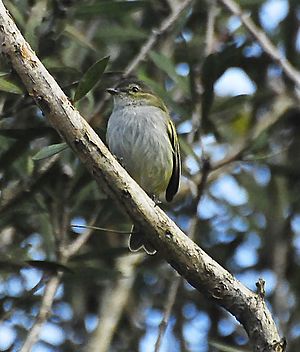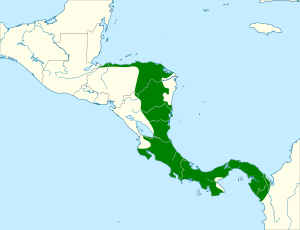Mistletoe tyrannulet facts for kids
The mistletoe tyrannulet (Zimmerius parvus) is a very small bird. It's a type of passerine bird, which means it's a perching bird. It belongs to the Tyrannidae family, also known as the tyrant flycatchers.
Quick facts for kids Mistletoe tyrannulet |
|
|---|---|
 |
|
| Conservation status | |
| Scientific classification | |
| Genus: |
Zimmerius
|
| Species: |
parvus
|
 |
|
Contents
About the Mistletoe Tyrannulet
Scientists group living things into categories. The mistletoe tyrannulet was first described in 1862 by an American bird expert named George Newbold Lawrence. He gave it the scientific name Tyranniscus parvus. For a long time, people thought it was the same species as the Guatemalan tyrannulet. But in 2013, after studying their DNA, scientists realized they were different species. So, they were officially separated.
What Does It Look Like?
The mistletoe tyrannulet is a tiny bird, only about 11 to 12 centimeters (about 4.3 to 4.7 inches) long. Grown-up birds have a dark gray cap on their head. They have a bright white stripe above their eye, like an eyebrow. Their back is olive-green, and their wings have bright yellow edges that are easy to see.
Where It Lives and What It Sounds Like
This little bird lives in an area stretching from Guatemala and Honduras in the north, all the way down to the northwestern part of Colombia. You can find it in wet evergreen forests, forest edges, and even in farm areas or open spaces with big trees. It's a pretty common bird in these places.
The mistletoe tyrannulet loves to call out! It makes sounds almost all the time. People describe its call as peeyaik, pee-peeu, or pee-yuip. Its call sounds a bit like another bird, the thick-billed euphonia, which also loves to eat mistletoe.
Behavior and Life Cycle
Nesting and Eggs
The mistletoe tyrannulet builds a round nest. It uses small roots, moss, and other plant bits. It hides its nest in thick plants or inside other plants that grow on trees, called epiphytes. The female bird usually lays two whitish eggs. These eggs have small rusty speckles on them.
What It Eats
This bird is a very active eater. It moves quickly, often with its tail held up, as it looks for food. It mainly eats small insects and other arthropods that it finds among the leaves. Sometimes, you might see it joining a group of different bird species that are all looking for food together. The mistletoe tyrannulet also enjoys eating fruit, especially the fruit from mistletoe plants.
See also
In Spanish: Mosquerito centroamericano para niños


